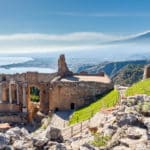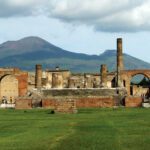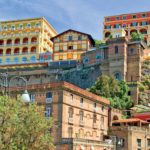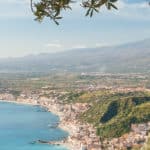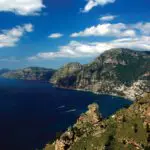Rome to Sicily
Acquaint yourself with Italy's 'Eternal City' of Rome and learn about the catastrophic fate of Pompeii. Soak up the sunshine in the coastal town of Sorrento and explore the beautiful Amalfi Coast, before heading south to Calabria, a hidden gem for those who stray off Italy’s beaten path. Continue to bustling Sicily, with the volcanic valleys of Mt. Etna, the timeworn streets of Syracuse, the Baroque wonders of Ragusa, the ruins of the Valley of Temples and the rich anti-mafia history of Palermo. Starring dramatic cliffside villages, clear waters and delicious seafood, this is a chance to experience the highlights of southern Italy.
23 days, from
$7,552
per person
GROUP SIZE
ACTIVITY LEVEL
Details
Countries Visited:
Italy
Accommodation: Hotel (20 nights), Guesthouse (2 nights)
Transportation: Train , Public bus , Private vehicle , Ferry , Metro , Cable car
Included Meals:
- 18 breakfasts
Group size: Minimum 1, Max 12
Wander around Rome's famous landmarks including the Colosseum, Vatican City, Sistine Chapel, St Peter's Basilica and much more. This is a city that bucket lists were made for
Feel La Dolce Vita while sipping espresso alongside sharp-dressed locals on the glamorous Sorrentine Peninsula
Explore the vast, frozen in time ruins of ancient Pompeii, which emerged from the ashes after thousands of years, and take a peak inside the steaming crater of Mt Vesuvius, the volcano that destroyed it
Hike among the olive groves on the Path of the Gods along the spectacular Amalfi Coast
Get up close and personal with the active volcanoes scattered across the Aeolian Islands and perhaps take a dip in one of the sulphur springs
Surrounded by dramatic valleys and craters set in a lunar-like landscape, towering Mt. Etna is one of the greatest natural beauties of the Mediterranean, and Europe’s largest active volcano
Search crumbling Greek and Roman ruins in the charming seaside town of Taormina
Itinerary
Buongiorno! Welcome to Italy. Crowded with ancient ruins and religious monuments, Rome still pulses to the beat of modern life and is packed with designer shops, restaurants, cafes and exciting nightlife. There are no activities planned before the group meeting at 6pm tonight, so you can arrive any time before then. It’s very important that you attend the welcome meeting as we will be collecting insurance details and next of kin information at this time. If you are going to be late please let your travel agent or hotel reception know. Ask reception or look for a note in the lobby for more information on where the meeting will take place. There are so many things to do in Rome – the Colosseum, the Forum, Piazza Navona, the Spanish Steps, Via Condotti, Piazza Venezia, the Vatican City and St Peter's Basilica – so arriving early is recommended. Don’t forget to do as the Romans do and sip an espresso at one of the tiny streetside cafes and sample the many flavours of gelato that colour the city, best done in the bohemian neighbourhood of Trastevere. For those captivated by the 'Eternal City', throw a coin into the Trevi Fountain to ensure a return visit to Rome.
Travel by train to Naples (approximately 3 hours), a raucous city that overflows with passion, tradition and gastronomy. Naples was carved out by many empires of the past and by merchants and pirates from across the world: Romans, Phoenicians, Carthaginians, Venetians, Spaniards, Normans and Africans. Its evocative, historical old centre is a World Heritage-listed area and the famous Spanish Quarter is still one of the most densely populated residential areas in Europe. Take an orientation walk with your leader and walk through the historical center and the Spanish Quarter. Finish your walk with a visit to the statue of the Veiled Christ. This treasured piece of art was carved over 300 years ago. Its sheer beauty and serenity will surely leave you in awe. Naples is the birthplace of the pizza, so why not head to one of the many pizzerias and taste what's truly some of the best that Italy has to offer. Later in the afternoon, board a train to the time capsule of Pompeii, in the shadow of Mt Vesuvius (approximately 1 hour). Your accommodation is perfectly located right near the entrance to the archaeological excavation site.
The small picturesque town of 'modern' Pompeii has a wonderful old town square – the perfect place to while away some time with the locals, drinking true Italian coffee and watching the world go by. Most of today though will be spent exploring the ruins of ancient Pompeii on a guided tour. Until 26 August, 79 AD, Pompeii was a thriving Roman trading centre, where ordinary people went about their everyday business, but it was frozen in time when Mount Vesuvius erupted, killing 2,000 people and their homes under a layer of ash. The city was never rebuilt and largely disappeared from people’s minds until the 18th century, when the ruins were re-discovered. Now you can take an unparalleled look back into the lives of ancient Romans and discover how they lived, worked and interacted 2,000 years ago. The finely preserved ruins include villas, temples, theatres and bustling markets. Walk along the chariot-marked streets, visit the magnificent amphitheatre and the ‘Villa of Mysteries’. You can also visit the Roman Forum and basilica, temples, public baths, and the tiny Odeon created for music recitals. The rest of the day is free, but if the ruins piqued your interest, head to nearby Herculaneum, which also holds a wealth of fossilised archaeological finds.
This morning take a bus up the mighty Mt Vesuvius, where you’ll meet a local volcanology guide. Ascend to the summit of Mt Vesuvius for staggering 360 degree views over the Bay of Naples and into the steaming crater. Although Mt Vesuvius is still considered to be an active volcano, the last eruption was in 1944 and there's no sign of lava. See first-hand the awesome power of the volcano that engulfed the cities of Pompeii and Herculaneum in 79AD. In the afternoon, travel by private vehicle to the picturesque resort town of Sorrento (approximately 1 hour). People have been coming to the peninsula and islands of the Sorrento region for at least 2,000 years, and set invitingly atop dramatic cliffs over sparkling, blue waters, it's easy to see why. There are many options in this small seaside town with its fine piazzas, maze of old streets, sidewalk cafes and glamorous shops. The area is also famous for its lemon groves, producing the famous limoncello liqueur. In the evening head out to try some of the best limoncello on offer in Sorrento.
You have a free day to explore this delightful area and the museums, galleries and piazzas of Sorrento. Perhaps stroll along the marina or cool off in the waters of the local small beaches. They’re not big on sandy beaches here, so swimming Sorrento-style is via wooden or stone bathing platforms beneath the cliffs. Taking a trip to Capri is also a great option, with a hydrofoil taking you across to the island that was once home to the magnificent holiday palaces of the Roman emperors. Capri’s dramatic rocky coastline is pierced by natural grottoes, while in the interior, narrow roads wind through fragrant citrus groves, past villages of flat-roofed white cubist-looking houses with flower-filled gardens, and manicured towns which offer swanky hotels and chic cafes. Here you can take a boat trip to the fairy-tale Blue Grotto (La Grotta Azzurra), where the water shines with an extraordinary blue translucence, a result of refraction of the sunlight outside. Your leader will be of assistance and will have plenty of suggestions of what to do and see today. End the day a very Italian way with a demonstration of Gelato making.
Arrive on the Amalfi Coast after a short journey by private vehicle (approximately 2 hours). The Amalfi peninsula is a land of rocky coasts, cliff-top vistas, azure seas, tiered lemon groves, whitewashed villages clinging to steep cliffs, and bright blue skies. If you're after a relaxing walk with a few cultural highlights, stroll from one side of Amalfi town to the other and pay a visit to the Cattedrale di Sant'Andrea and the Chiostro del Paradiso. If you’re after something more active, perhaps embark on a walk through the Valley of Mills where for centuries paper mills were in operation. Alternatively catch a bus up the Valley of Dragons to reach pretty Ravello. The French novelist André Gide once described this town as being ‘closer to the sky than the seashore’. For centuries, its lofty position and sunny, dry climate has made it an appealing place for writers, artists, musicians and travellers. Ravello also boasts two magnificent villas – the superb 11th Century Villa Rufolo which was once the home of Wagner, and Villa Cimbrone, a sumptuous 19th Century mansion with fabulous gardens and unequalled views over the Gulf of Salerno. Otherwise just laze around on the beaches and in the piazza, gazing back up at the amazingly picturesque part of the world.
Your leader will take you for a half-day hike along the narrow trail of the famous Sentiero Degli Dei (the Walk of the Gods) which, until quite recently, was followed by mules and donkeys as they traversed the dramatic landscape. This path winds its way through unique scenery and boasts unrivalled views along the coast. Walk through forests and fields of wildflowers, olive groves and vineyards, past ancient stone huts and beside sheer walls of granite. Glimpse local farmers tending their crops by hoe and elbow grease, herds of goats feeding beside the trail beside their shepherds, and teams of workmen commuting by mule. The trail ends in picturesque Positano where there will be ample time to explore and maybe take a dip in the sea. Return to Amalfi by ferry which is the perfect way to see the coast from a different perspective. With tonight your last night as a group, it’s a good idea to gather your fellow travellers together and head out for a feast to celebrate the end of this Italian adventure.
Today is a free day for you to explore the region surrounding Amalfi. A great way to see the beautiful Amalfi coastline and take in the sights is to board a boat – there are regular seasonal services between Amalfi, Positano and Capri. It is also highly recommended to walk down into the shaded Valle dei Mulini (Valley of the Watermills). Here you will find remnants of Europe’s earliest paper mills, strewn among thick foliage fed by the valley's streams. You may pass locals collecting wild mushrooms and stout men carrying half their body weight in lemons on their heads. The path takes you deep into the valley and the entrance to the nature reserve of ‘Valle delle Ferriere’ (Valley of Iron). This is one of the most interesting nature reserves of the area and an ideal place for lunch. Or perhaps visit neighbouring Atrani, the best-preserved town on the Amalfi Coast, with narrow little streets and a serene town square.
This morning you'll travel to Civita by boat, train and private vehicle. It's a tad complex logistically, but well worth the effort to see this gorgeous village built into the rocky hillside. Civita was founded by Albanian refugees in the Middle Ages and the Civitesi are recognised as an ethnic minority by the Italian Government. Their language, arberesh, is a mixture of Italian and Albanian and is only spoken here and in some parts of Sicily. Take a walk around this fascinating village on arrival then perhaps choose to visit a local winery and cheese producer, or just walk in the scenic hills instead.
After breakfast today, you’ll hike into the beautiful Pollino National Park that surrounds Civita. With sheer cliffs, narrow canyons and a diverse range of wildlife including the peregrine falcon, eagle owl and the recently reintroduced Egyptian vulture, this area is a wildlife lover's paradise. If you'd like to opt out of the hike, you can kick back on the terrace of your guesthouse and enjoy the scenery and hospitality of the locals. The afternoon and evening are at your leisure.
After breakfast this morning, you’ll transfer from Civita to Paola, before taking the train onwards to Tropea. Tropea has a striking sense of timelessness, created by the streets full of faded buildings and the iconic fortifications that line the city’s cliffs. Explore the town as you head out on an orientation walk. You may want to visit the local Norman cathedral, the Duomo, which holds an icon of the town’s celebrated protectress, the Madonna of Romania. There’s also the Museo Diocesano, a tiny museum hiding in the Palazzo Vescovile next to the Duomo, which is full of religious art and wooden statues. If you’d prefer some time by the water, feel free to head to the beach and marvel at the looming structures on the cliffs nearby.
Enjoy a free day in the Mediterranean paradise of Tropea. Perhaps, reserve a spot on the beach, soak up some sun and cool off in the clear blue water, or maybe you'd prefer to sample Tropea's specialty: cipolla di Tropea. These are Italy's, and perhaps the world's, favourite onion thanks to their unique sweetness. Rumour has it you can even find a red onion ice cream in town, so why not give one a try as you kick back by the water.
If the weather is fine, take an included boat trip to the Aeolian Islands of Vulcano, Lipari and Stromboli. These islands, affectionately referred to as ‘pearls of the Mediterranean’, attract all manner of adventurers and thrill seekers to their shores due to their natural beauty and volcanic activity. The trip will start with a boat ride to the aptly named Vulcano, where you’ll have a chance to dip in either the crystal waters or the famous sulphur springs as they sit in the foreground of an active volcano. Then, land on the isle of Lipari where you’ll have free time to visit the museum, have lunch, go shopping or stroll through the streets. Following Lipari, you’ll pass the isle of Panarea and travel to Stromboli to learn about the famous Sciara del Fuoco (street of fire) before spending free time on the island’s black sandy beaches. Afterwards, return to Tropea where you’ll spend the night.
Depart from Tropea by train as you travel onward to Reggio Calabria, the gateway to Sicily. The city’s placement in a major earthquake zone has caused much destruction over the years, meaning only few historical sites remain in comparison to the rest of Italy. However, this has resulted in a charming mix of architecture - balanced between the surviving old buildings and the modern structures. Embark on an orientation walk, before visiting the widely renowned National Archaeological Museum of Reggio. This building is arguably the most important tourism destination that the region has to offer, featuring an excellent collection of exhibits from Greek influenced sites across Calabria, including the Bronzi di Riace, two large bronze statues found on the sea floor in the 70's. Later in the evening perhaps hunt down some of the city's spectacular restaurants for grilled swordfish or pasta with cauliflower and broccoli (both are dishes typical to the area) and a glass of local wine, or wander past the city’s panoramic waterfront.
Bid farewell to Reggio Calabria and travel by ferry to Messina in Sicily, where you’ll enjoy a felucca ride, a typical boat of the Strait of Messina for sword fishing. You'll experience the thrill of a fishing trip with the locals and learn about the traditions and natural wonders of the Strait of Messina. After your felucca experience, you’ll board a bus to the atmospheric city of Catania. The city has a unique energy to it, an interesting blend of young and old. On one hand, there’s a gritty, attractive bar culture that fuels an exuberant nightlife, full of flavour and laughter. On the other hand, the very core of the city boasts one of the fabled “Late Baroque” towns – the UNESCO World Heritage site, Val di Noto. You’ll get the opportunity to explore both sides of this curious city by walking through its grand piazzas and wide roads. The evening is yours to enjoy, so perhaps get a gelato or a granita to cool off at the end of a busy day of exploration.
Take a day trip to the charming city of Taormina. Start things off with an orientation walk, where you’ll notice the Greek influence in the architecture. Walk through the back streets, gardens, and perhaps visit the world-famous Greek theatre and the cathedral. The whole afternoon will be at your leisure, so there's plenty of time to explore at your own pace. Have a drink in the Mediterranean sun or dig into some traditional Sicilian pasta before heading back to Catania for your final evening. Perhaps, head out with your newfound travel companions for one final pasta dinner together and toast to the Calabrian adventures you shared.
Enjoy a free day in the charming Catania until your 6pm group meeting.
Today it’s time to come face-to-face with the volcano that towered over you yesterday, we’re taking a day trip to drive up Mt Etna, Europe’s largest active volcano. Drive up the northern flank of the volcano and strap on your walking shoes for an easy walk through the spectacular Valle del Bove (Bull Valley), a valley formed when the original crater of Etna collapsed. This is Etna’s largest valley, where many lava flows can be seen, one on top of the other. At an altitude of approx 2,000 metres, you’ll walk into the centre of an extinct crater and visit a lava cave that can be explored with helmets and torches. Who else can say they’ve walked into the crater of a volcano? Walk among the cold lava streams of Piano Provenzana, a former ski resort that has been destroyed during the last big eruption of 2002. After we’re throughly explored Etna, we’ll hit the road to Syracuse where your leader will take you on an orientation walk through the most interesting parts of the city. The evening is yours to explore, or chill out, as you wish.
Wake up without an alarm today, you’ve got the day at your leisure to explore Syracuse however you like. Perhaps, wander through the streets and check out the crumbling building facades and balconies supported for centuries by a host of stone lions, tigers, bears, dragons, moors, satyrs, devils, angels, kings, paupers, wenches and cherubs. Perhaps take a boat trip around the island of Ortigia for a scenic view of the walled off cityscape. Or, you may want to participate in an optional visit to the Neapolis Archaeological Site – known as one of the world’s finest. Alternately, we’re sure you could fill your whole day just wandering aimlessly through this fascinating city, stopping by cafes, restaurants and perhaps grabbing a granita in the afternoon.
After breakfast today we’re setting our sights for the city of Agrigento. But first, there’s one quick stop along the way that simply can’t be missed – Noto, a small slightly less-known town with limestone buildings that dazzle on a sunlit afternoon. Our next stop is the ‘new’ baroque city of Ragusa that was completely rebuilt after the devastating earthquake of 1693, resulting in two vastly different sides to the same city. After exploring the tangled alleyways and baroque palazzi, travel on to the final destination for today, Agrigento. Arrive late in the afternoon and enjoy some free time. Maybe find the historic center that extends up the Colle di Girgenti hill including Via Atenea and Viale della Vittoria, where there’s a panoramic view over the valley (Valley of the Temples) and the sea for sunset. Plus, be sure to try the famous gelato pecorino in one of the local cafés and patisseries.
You’ll take a step back in time today as you explore the nearby Valley of the Temples. Your local guide will bring this classical Greek site to life as you visit the temples of Hera, Herakles, Zeus and Castor and Pollux. Try to nab a window seat today, along the way you’ll enjoy magnificent views of the sweeping landscape and Mediterranean Sea. After the guided tour in the Valley of the Temples, you’ll head on to Marsala a coastal town in the west of Sicily.
Today you’ll set your sights on Palermo, but not without a few scenic stops along the way. First up, we’ll explore the beautifully preserved medieval town of Erice (located more than 750 metres above sea level). Despite being handed from one ruling army to the next, there are plenty of beautiful buildings in this town, each showcasing architectural styles from a varied history. Before you get back on the road, be sure to pick yourself up a Genovesi – a traditional Sicilian pastry filled with custard or ricotta cream. With a belly full of sweets, we’re on our way to the capital of Sicily – Palermo. On arrival in Palermo the afternoon is free for you to explore as you wish. You might like to wander the labyrinth of small alleyways, buzzing colourful market squares and winding roads. Or, check out some of the main monuments like the 12th century cathedral in the old heart of the city.
Wake up excited and ready to explore the beautiful city of Palermo. You’ll have the option to visit nearby Monreale this morning, situated in a panoramic position above Palermo with fantastic views over the city and the sea. You’ll get a chance to visit the cathedral here, described as one of the ‘wonders of the medieval world’, and climb to its roof. Alternately, you might like to take a free morning to wander the city at your own will. In the morning, you’ll take part in a walking tour with a local guide where you’ll uncover symbolic places of rebellion and anti-mafia racketeering. Places such as the Teatro Massimo, Cape Market, Piazza della Memoria, Beati Paoli Square and more all have a rich history in civil mobilisation – plus, they are known to serve delicious street food. Dig in! You’ll get a chance to meet shop owners who have had the courage to denounce their extortionists. This evening, perhaps share a bite to eat and toast to the week that was with your group before the adventure comes to an end tomorrow.
Your adventures come to an end today after breakfast. If you’d like to stay and explore more in Palermo we can arrange additional accommodation on request (subject to availability).
